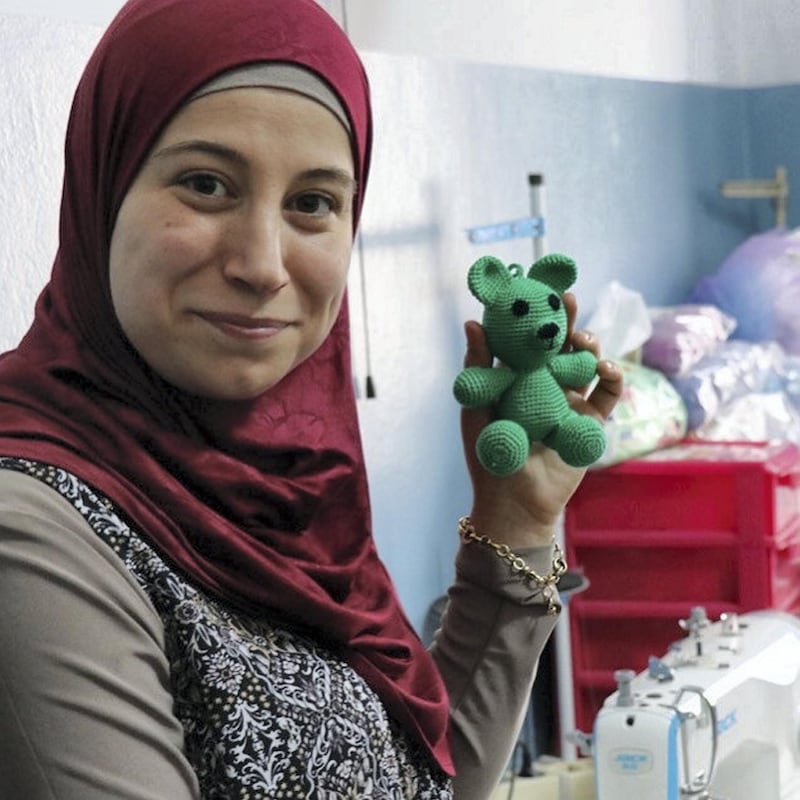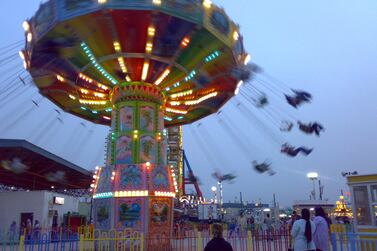Crocheting was once something Nour Kahwaji only did in school, back in Syria. But in the past four months it has become both a financial and psychological lifeline for the mother of four, 38. "It's a way to reduce the pressure; it's mentally a support," says Kahwaji, who is from Jobar in the Damascus suburb of Eastern Ghouta, much of which has been devastated by the eight-year conflict in Syria. "The work needs your full focus so it's a way to forget about difficult memories and problems."
As a refugee living in Lebanon's Bekaa Valley, Kahwaji has a lot to worry about. A recent government crackdown on Syrians working without permits has left her husband jobless, while the mass protests that broke out in Lebanon last month have made the already fragile security situation in the country even more unstable.
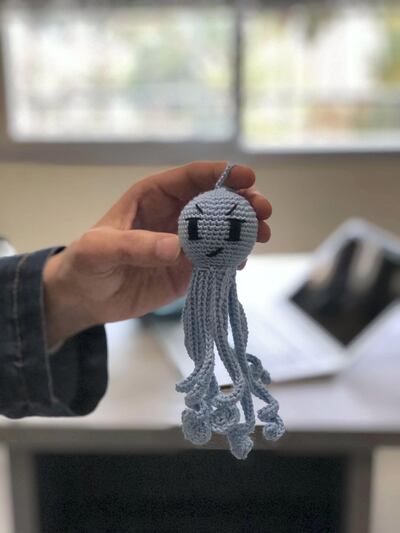
Kahwaji is a member of the Crochet Community Collective, an initiative launched in July by the Syrian-led, non-government organisation Multi-Aid Programs (MAPs) to help vulnerable Syrian and Lebanese women in the Bekaa and Arsal regions earn a living through crocheting.
Women working for the collective earn far more than the average wage
While female Syrian refugees living in Arsal earn an average of $49 (Dh179) a month and those in Bekaa just below $100, according to the UN, women in the collective have so far been receiving a monthly pay packet of $150 to $300 from the sale of their crocheted animal "dolls" and other items. And, MAPs says, there is the potential for the women to make as much as $420 a month.
"Signing the contract for this work was a very good step in terms of knowing our responsibilities and tasks and in giving us a sense of stability," says Kahwaji, who didn't work outside of the home in Syria, but is now the sole breadwinner for her household. "It gives us hope that we will have a regular income and be able to support our families."
The level of income combined with the safe and flexible nature of the work – members of the collective are free to crochet in their homes and to take on as much work as they want, depending on availability – means that there is a waiting list to join the 40-strong group. Standards are high, however, and it is not enough for a space to simply open up; the women must also be able to prove their skills.
Crochet is a traditional Syrian craft and the majority of women in Syria know how to do it, says Bayan Louis, 27, the collective's project co-ordinator who is herself a Syrian refugee.
“It was traditionally [passed down in] a chain, from grandmother to mother to daughter, and we especially did it in the summer holidays from school.”
Adaptability and creativity have proved necessary survival tools for many Syrian refugees and the work of the collective is no different. Where women in Syria commonly crocheted items of clothing such as scarves and jackets, the collective's members are using the traditional craft to create fun and modern designs that appeal to an international market.
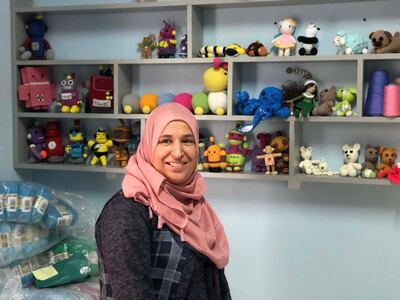
Some of their most popular products are octopus dolls, while a British university recently put in a bulk Christmas-themed order that included reindeer, Santa dolls, penguins, snowmen, bells and hearts.
With most items stitched with a small loop at the top, they can be used as keychains, tree ornaments or wall decorations. The collective also has a recurring order for red and green teddy bears that are sold to a company in Norway for use in a psychosocial support programme.
"My favourite thing to crochet is the octopus because there's not a strict design and we can change the character of each one," says Kahwaji. "The character I make depends on my feeling when I'm working. If I'm angry or anxious then I crochet the octopuses with angry faces; when I'm relaxed I check new samples sent by our trainer and take inspiration from them.
"For example, yesterday my husband made the final decision about a family problem and I didn't agree with it. So my expression was reflected on the octopus," she says, laughing and holding up a doll with a distinctly unamused face.
Crocheting is a way for women to be the breadwinners of the family
Like Kahwaji, the life of the collective's trainer, Wafaa Al-Zohoury, 40, has also been changed by the group. Back in Syria, the mother of four worked part-time as an instructor for sewing, fashion and design courses at a local institute. But her husband was the main breadwinner and crocheting used to be something she only did in her spare time.
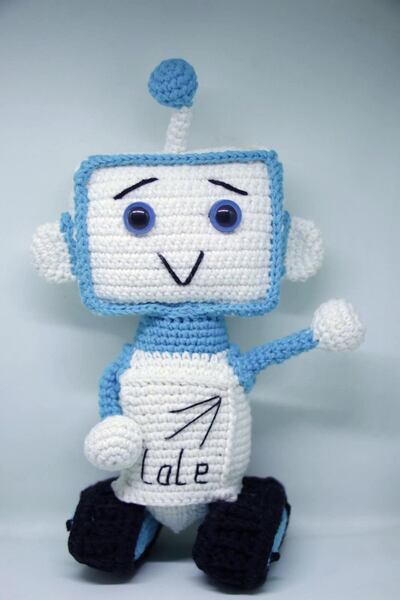
Now, Al-Zohoury is the main breadwinner and her family is reliant on her work with the crochet collective. "It's very difficult," says Al-Zohoury, who is from the Homs suburb of Al-Qusair. "When I was working in Syria, my income wasn't necessary for keeping my family stable. The difference here in Lebanon is that we have many needs and I cannot take a break. I have to work because the responsibility level is very high and I try to work as much as possible."
The two first met each other last year when they were part of a vocational training programme run by MAPs in partnership with the World Food Programme. Al-Zohoury was the trainer and Kahwaji a participant. It was while they were here that MAPs noticed the women's creativity and realised the potential for the collective.
It is clear that Al-Zohoury has become a valued mentor for Kahwaji and the other women, who have a WhatsApp group where they can ask each other for help and advice. "Even though we have graduated now and know how to crochet, all the time we want to benefit from the trainer because she is perfect and has incredible ideas," says Kahwaji. "She's always available to check and evaluate our work, advising us about mistakes."
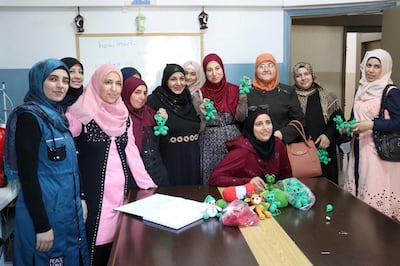
But these women aren't the only people the collective is designed to help: while they receive 50 per cent of the proceeds from the sale of each item they make, the other 50 per cent goes towards buying more materials and funding one of MAPs' nine teaching centres for the academic year.
The centres consist of converted shipping containers and are located in tented refugee settlements in the Bekaa and Arsal areas. A minimum of $60,000 is needed to fund the centre in Saadnayel, which equates to 15,500 sold items for the women. Currently, they're up to 3,300.
The protests have introduced difficulties, but the organisers have faith
Ambitions such as these are a key part of the vision of MAPs' director, Dr Fadi Al-Halabi, 35, a former neurosurgeon who founded the NGO after fleeing from Syria to Lebanon in 2013. "It's so important when you think about any humanitarian work to also think about how that work can make a social change in the wider community," he says.
For him, this social change includes improving the mindset of Syrian refugees and giving them back a sense of dignity, and a feeling that they are not victims, but people with their own solutions.
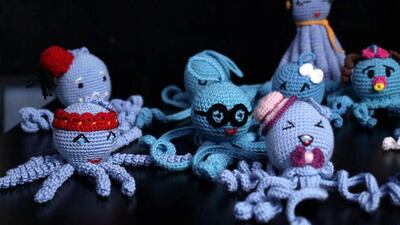
The successes of the crochet collective come amid difficult times for the country. The ongoing protests and political unrest in Lebanon are making travel and transport tricky. "Still, I have faith," he says. "Maybe the road is blocked now. But we [always] have small or marginal spaces or roads from which we can [continue our] work."
